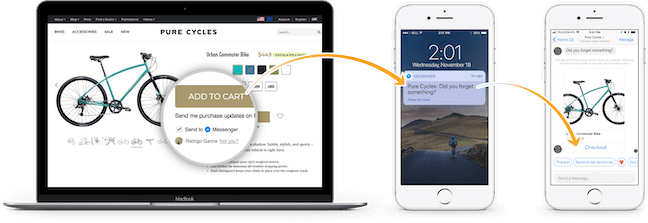Facebook Inc. CEO Mark Zuckerberg spent Tuesday morning explaining to an audience of app makers why it’s been so hard to work with his social network lately. But, even as the relationship has become more fraught, there are still two bright spots: virtual reality and messaging.
A crisis that unfolded in recent weeks over Facebook’s sharing of personal user data with third parties led the company to shut down several of its tools for app makers, causing some of their businesses to break. One such function allows developers to make their apps more easily, by letting them automatically ingest certain data—for example, login information. Now, at its F8 conference starting Tuesday in San Jose, California, Facebook will work to persuade those developers to keep building for its platform.
First, Facebook is offering some relief. The company had stopped reviewing and approving new apps using Facebook’s developer tools while it figured out where to restrict its data sharing. On Tuesday, it will start that process back up again.
While Facebook’s main social media app has more than 2 billion users, there are two fledgling parts of the company that still rely deeply on app makers’ interest in building. Messenger, its global chat app, and Oculus, its virtual-reality headset division, both offer new opportunities for developers to make their mark.
Messenger
Facebook Messenger has more than 200,000 developers building for it, says David Marcus, head of the division. He wants them to keep building software-based chat bots for companies to communicate with their users and said the number of individual bots on Messenger has tripled to 300,000 since last year.
The company said that those programmers will now be able to build in-app video demonstrations of their products, sometimes by overlaying them directly on a user’s live video of themselves. For example, makeup retailer Sephora—No. 131 in the Internet Retailer 2018 Top 1000— could let people try different shades of eyeshadow and lipstick on their actual faces, while in conversation with the brand via Messenger, and send the options to their friends as they show up in the chat. Or Nike, No. 27, could launch a new shoe, with a 360-degree view of the sneaker.
“In the vast majority of cases where you want to build a rich experience like this, you have to build an app,” Marcus said. Now, Facebook is making it possible to build those tools within Messenger.
For instance, chatbot-building tool Octane AI announced an integration with Shopify Inc. that enables the e-commerce platform’s merchants to link Octane AI to their Shopify accounts. In doing so, they can create chatbots that offer a host of skills that range from helping shoppers find products to responding to common customer queries to connecting with consumers when they abandon their shopping carts. On average, Octane AI stores can message more than 90% of customers who abandon their carts, the vendor says, and one out of nine messages sent converts into a sale.

VerClare Boutique, Pure Cycles, Pearl Paradise and other merchants that tested the technology generated 7-25% boosts to their revenue, the vendor says.
Messenger also is enabling translation services in chat, which will let users have conversations with people and brands in other countries. It will employ the same translation tools that Facebook uses in the news feed.
The Messenger app wasn’t spared from the privacy checkups Facebook did across its whole business, Marcus said. Those audits resulted in some changes. Some developers who provide technical support for multiple businesses had to sign new contracts, saying they can’t use data from one business in their services with another.
“The identity you have with one brand should only be available to the brand and not cross-referenced,” Marcus said. “We just want to make sure.”
Oculus Go
Facebook will finally start selling its cordless virtual-reality headset—Oculus Go. The headset will be available in 23 countries on Tuesday. To lure a more mainstream audience than past headsets, the company needs developers to think beyond gaming.
The limited accessibility of VR headsets so far—mainly because of high prices and the need to be strapped to an external Windows-based personal computer—has meant that VR developers weren’t able to reach a broad customer base, holding back sales. But at $200, the Oculus Go will be far cheaper than rival devices and doesn’t need to be tied to a smartphone or PC. Facebook declined to say whether it’s making any money off of the headset.
The Oculus Go, which will come pre-loaded with an application and game store, is designed to do what the iPhone did for smartphone apps a decade ago. Facebook says that more than 1,000 apps, games, and movies will be available to download on the headset. That includes apps from streaming-video services Netflix Inc. and Hulu LLC, not just games. Oculus executives said they expect the device will draw consumers who live with roommates and want to watch a different show than what’s playing on the TV, or people who want to take a portable entertainment device on planes.
Facebook has been wooing developers with the headset for months, after announcing it last year and then giving test units to some app makers. At F8, Facebook will unveil several new apps for the device, including Oculus Venues and Oculus TV. The Venues app allows users to virtually watch a live event, while the TV app—like the one on the iPhone and iPad—serves as a launchpad to various television offerings.
Another app, Oculus Rooms, will let four people virtually hang out in a customizable, living room-like space and will allow them to play table games like Monopoly and Trivial Pursuit within that environment.
Oculus is keeping its focus on virtual reality even as other major technology companies, including Apple Inc. (No. 2) and Amazon.com Inc. (No. 1), place their bets on augmented reality as the potentially bigger market. Augmented reality combines virtual images with real-world ones, instead of encompassing users in a completely simulated environment. Facebook has in the past asked developers to build augmented-reality tools for other parts of its business, like the short ephemeral videos that compete with Snapchat Stories.
There are some drawbacks to developing for Oculus Go. The headset can only run for 1.5 to 2 hours on a single battery charge for gaming, and up to 2.5 hours for watching video. That’s a limited amount of playing time, which could hurt a consumer’s connection to a developer’s app. There’s also a health and safety warning, asking users not to stay immersed in the headset for more than 30 minutes because of the risk of becoming nauseous. Oculus doesn’t prevent people from using it for longer.
Also at F8, Facebook announced that Instagram will let people post information from apps directly to their Instagram Stories, which last for 24 hours. For example, while listening to a song on Spotify, someone would be able to tell their Instagram friends what title or album it is. People will also be able to directly share action shots from their GoPro apps.
In 2012, Facebook announced Open Graph, a feature that automatically posted songs you’re listening to, stories you’re reading and other activity, directly to your Facebook feed. Users didn’t love the forced transparency, and Facebook stopped pushing it a couple of years later. Now the company is taking a different tack with one crucial difference—letting users pick when they post, instead of having it happen automatically.
Historically, Instagram hasn’t let users share much from the outside world. Hyperlinks don’t even work, except in profiles. That was a conscious choice from the company’s founders, who wanted to make sure that everything posted on the app was a reflection of what a user created, not what they curated from others. It helped Instagram avoid some of Facebook’s problems, like viral fake news.
Stories is a part of the app where Instagram is, increasingly and intentionally, breaking its own rules. Within Stories, Instagram already allows sharing of news stories, for example. And now, with direct-sharing from applications, people won’t have to screenshot their Spotify playlists in order to post them.
Zuckerberg said that Stories, a feature invented by Facebook’s smaller competitor, Snap, will be an increasingly important part of the company’s future. So far, Stories are the most popular on Instagram and WhatsApp, Facebook’s chat app.
Zak Stambor contributed to this report.
Favorite
